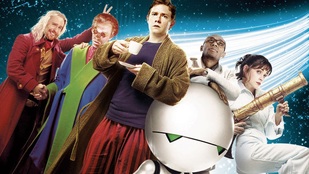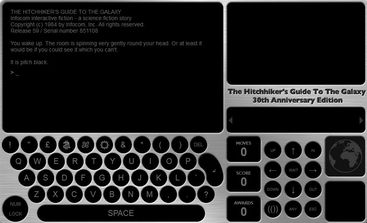
>You wake up. The room is spinning very gently round your head. Or at least it would be if you could see it which you can’t.
It is pitch black.
What do you do?

It's the best way to show appreciation to Douglas Adams, science fiction writer and legendary author of The Hitchhiker's Guide to the Galaxy series of novels. And it is on that very subject we move the sun onto this morning.
Prepare to be whizzed back to a time when video games were either point-and-click stories or text-based adventures. The Hitchhiker’s Guide to the Galaxy game, originally written by Douglas Adams and programmed by Steve Meretzky in the late seventies, turned thirty back in March. The game features simple, thought-based gameplay like many games of its era, meaning that you will have to progress through a trial-and-error method at first before fully getting to grips with what simplistic sentences to respond with, bearing in mind that the A.I. is only programmed to reply to certain things. The game, like all text-based adventures, plays out like an interactive novel set within the familiar universe of Hitchhiker series. It is also rather frustratingly difficult to navigate, although I believe that is the idea.
Whilst the modern player might lose patience with such an experience the older, more experienced gamer will remember the ZX Spectrum, which is an ancient relic by today’s standards. The old console (if you could even call it that) had a whole library of similar games during the more cretaceous period of gaming history.
Whilst the gameplay of Hitchhiker might feel somewhat sluggish and – well let’s be honest – virtually non-existent by today’s standards, the gem of this franchise has always been found in the wonderfully British humour and thankfully this has never changed. For instance, within the opening few moments you receive two ‘items’ within your inventory, one of which is a ‘splitting headache’ and the other is ‘no tea.’ The humour is somewhat satirical, mocking you as the player during your quest to find out what the game’s story is actually about. Surprisingly, there’s certain immersion to be found by playing. As you are indirectly interacting with Douglas Adams himself and making a decision based on the choices he presents you with. This gives the game a more personal feel than most modern games and provides quite a unique enjoyment.
Whilst it’s very difficult to review such a retro-style game (since I’m so used to commentating on the more modern genres), fans of the series and fans of Adams’ other works will certainly find this game amusing and memorable. If anything, it is certainly unique!

 RSS Feed
RSS Feed
